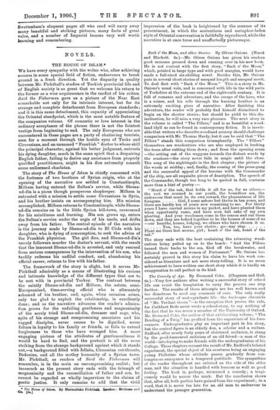NO THE HOUSE OF ISLAM.* WE have every sympathy with
the writer who, after achieving success in some special field of fiction, endeavours to break ground in a fresh direction. Yet the disparity in quality between Mr. Pickthall's studies of Turkish provincial life and of English society is so great that we welcome his return to the former as a wise acquiescence in the verdict of his critics. Said the Fisherman gave us a picture of the Near East remarkable not only for its intrinsic interest, but for its strange and complete detachment from European standards; and it is this same detachment, this capacity of appreciating the Oriental standpoint, which is the most notable feature of the companion volume. Of romantic or love interest in the ordinary acceptance of the phrase there is not the faintest vestige from beginning to end. The only Europeans who are encountered in these pages are a party of chattering tourists, seen for a moment through the hostile eyes of Turks and Circassians, and an unnamed " Prankish " doctor to whose skill the principal character, against his better judgment, entrusts his dying daughter, much in the same spirit that a despairing English father, failing to derive any assistance from properly qualified practitioners, might in his dire extremity consult some unlicensed charlatan.
The story of The House of Islam is chiefly concerned with the fortunes of two brothers of Syrian origin, who at the opening of the narrative are settled in Constantinople, Milbem having entered the Sultan's service, while Shems- ud-din is a pious though prosperous shopkeeper. Milhem is entrusted with a mission to settle some Circassians in Syria, and his brother insists on accompanying him. His mission accomplished, Milhem returns to Constantinople, while Shems- nd-din remains on in the little Syrian hill-town, reverenced for his saintliness and learning. His son grows up, enters the Sultan's service under the aegis of his uncle, and drifts away from his father. The central episode of the narrative is the journey made by Shems-ud-din to El Cads with his daughter, who is dying of consumption, to seek the advice of the Frankish physician. The girl dies, and Shems-ud-din's unruly followers murder the doctor's servant, with the result that the innocent Shems-ud-din is arrested, and only rescued from serious consequences by the intervention of his son, who tardily redeems his unfilial conduct, and, abandoning his official career, returns to live with his father.
The framework of the story is slight, but it serves Mr. Pickthall admirably as a means of illustrating his curious and intimate knowledge of the different types that are to be met with in provincial Turkey. The contrast between the saintly Shems-ud-din and Minim, the astute, semi- Europeanised, time-serving official who is alternately ashamed of his brother, and, again, when occasion arises, only too glad to exploit the relationship, is excellently done ; and as the narrative advances the reader's admira- tion grows for the unfailing gentleness and magnanimity of the sorely tried Shems-ud-din, dreamer and sage, who, spite of his strange and compromising associates and his ragged disciples, never ceases to be dignified, never falters in loyalty to his family or friends, or fails to extend forgiveness to those who have wronged him. A more engaging picture of the attributes of gentlemanliness it would be hard to find, and the portrait is all the more striking from the strange background against which it stands out,—a background filled with fellatio, Circassian cut-throats, Bedouins, and all the motley humanity of a Syrian town. Mr. Pickthall, as readers of Said the Fisherman will remember, is in the main an uncompromising realist; but inasmuch as the present story ends with the triumph of magnanimity and the reconciliation of father and son, he cannot be regarded as wholly impervious to the claims of poetic justice. It only remains to add that the vivid • The Hons. qf Islam. By )(armadas PiathalL adon: Methuen and [6s.]
impression of the book is heightened by the manner of its presentment, in which the sententious and metaphor-laden style of Oriental conversation is faithfully reproduced, while the narrative is at once terse and unaffectedly picturesque.






























































 Previous page
Previous page